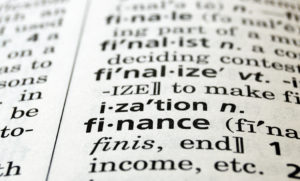Offering home improvement financing for your customers is an easy way to differentiate yourself from your competitors while helping your customers. However, not everyone is familiar with financing basics. If you or your customers get stuck on our financing jargon, we’ve got you covered. Here are some of the most common financing terms and abbreviations you may run into.
Consumer Financing Terms
Amortization Schedule: A table detailing each scheduled payment on an installment plan. It does not take extra payments, late payments or fees into consideration.
Annual Percentage Rate (APR): The annual interest rate charged to a customer for borrowing funds expressed as a single percentage.
Approval Tiers: Credit tiers based on a customer’s credit profile that affects what type of bid and promotions a dealer will receive from FFC. We have 3 approval tiers:
- SuperPrime (Tier 1): 100% payouts for well-qualified buyers with excellent credit.
- PrimePlus (Tier 2): 100% payouts for near-prime buyers with good credit.
- Standard (Tier 3): Approvals for customers with riskier credit who would likely be declined by other lenders. A risk discount, based on the customer’s credit and application factors, is assessed to the dealer.
Authorized Party/ Authorized Third Party: Any person or entity given permission by the customer to discuss their financing with FFC.
Credit: An agreement between a lender and a customer to borrower an amount of money for which the customer will be trusted to repay.
- Closed End Financing: Fixed-term financing including principal and interest repayment at monthly intervals. Also known as an installment plan.
- Open End Financing: Where an agreed upon amount can be used and paid back repeatedly up to a certain limit for a certain time frame. Also known as a line of credit or revolving line of credit.
Customer/Consumer: The person who borrows the funds from FFC, signs the financing documents, and is responsible for paying the funds back.
Dealer: Contractor or company approved to submit customer applications to FFC.
Debt to Income Ratio (DTI): Compares a customer’s monthly gross income to their outstanding debt liability payments.
Decisioning (Underwriting): The process of verifying a customer’s credit, income, assets, debt, and property details to assess whether to approve or deny a financing application.
Description of Goods (DOG): A detailed description of the project completed for the customer by the dealer.
Funded: FFC has paid the dealer the sale amount minus any agreed upon dealer fees, also known as the net disbursement amount.
Install Address: Address where the work was completed, or items listed in the description of goods were installed.
Installments: When a customer has a fixed term or number of payments. Also known as closed end financing.
LaunchPAD Dealer Portal: FFC’s online resource for dealers to quickly submit credit applications, generate documents, track application statuses and more.
Loan Completion Certificate (LCC): A form issued by the dealer and signed by the customer attesting that the project has been completed in conformity with all plans and specifications of the project. Typically required prior to funding.
Maturity Date: The date when the final scheduled payment is to be made and the entire balance is due including principal, interest and fees to satisfy the financing agreement. Revolving lines do not have a maturity date.
Net Disbursement: The amount of money funded to a dealer by FFC. (Financed amount minus any dealer fees.)
Notice of Cancellation (NOC): A clause located on the financing contract detailing the terms by which a party has the right to terminate the contract without financial penalty. Also known as the right to rescission.
Payoff Balance: The amount that would need to be paid to satisfy the terms of the financing contract. This amount is different from the principal balance or current balance and can include principal, interest and fees.
Pricing: A scale used to determine lending costs on financing products. The rates are determined by a customer’s credit worthiness and risk.
- Prime: These borrowers have high credit scores and low risk. Financial companies offer their best interest rates to customers with good credit.
- Near Prime: Individuals with fair or average credit, who may have some missed payments in their credit history but are financially stable.
- Subprime: Individuals who have weaker credit ratings who pose higher risks to lenders.
Promotion: Special terms or products FFC offers, such as deferred payments, same-as-cash, and reduced APRs.
Revolving Line of Credit: Financing that is considered open ended credit, does not have a fixed number of payments or a set maturity date. A minimum monthly payment is required and determined by a payment factor. The account cannot be paid ahead, and additional payment would be applied as a principal reduction.
Risk Discount (aka dealer fee): A cost to the dealer based on the customer’s credit profile; the weaker the credit the higher the fee. Risk discounts range from 0-20%.
Second Look Financing (Discounted Financing): A way for lenders to approve a wide variety of credit by sharing some risk with the dealer. FFC considers customers with FICOs as low as 600.
Stipulation: A condition or requirement that is specified as part of the financing agreement. They may include: proof of employment, proof of home ownership, invoices, permits, etc.
Truth In Lending (TIL): A financing origination document that discloses finance terms and the cost of borrowing funds.
Financing can seem daunting if you aren’t already familiar with the lingo, but let us show you how easy it can be! Enroll in the Foundation Finance dealer network or contact us for more info: 1-855-241-0024, sales@foundationfinance.com.



